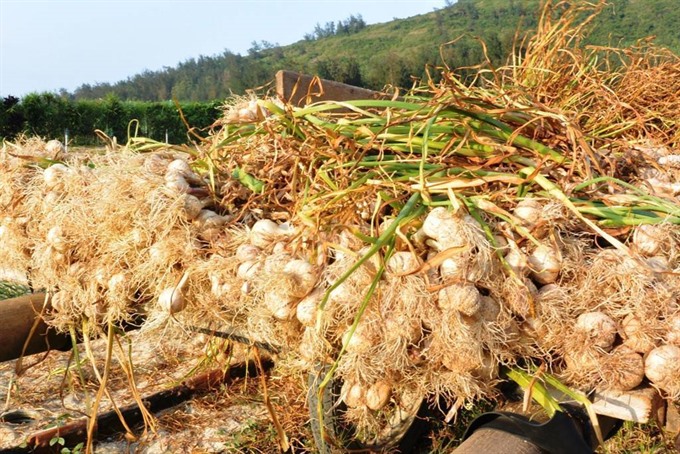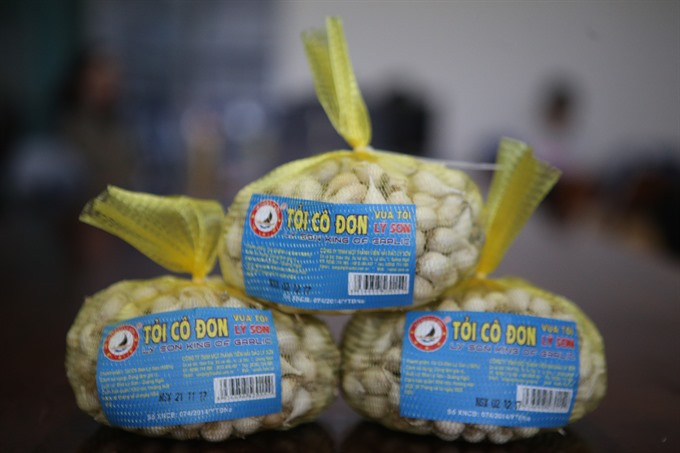 Economy
Economy

The mass trade of imitation products and a lack of Geographical Indication (GI) are seen as major reasons behind falling prices for Lý Sơn garlic, the product known as the ‘King of Garlic.’
 |
| Garlic is harvested in the island district of Lý Sơn, off the coast of Quảng Ngãi Province. Garlic from other regions packaged as Lý Sơn products and a lack of brand protection have caused price drops. — VNS Photo Công Thành |
LÝ SƠN — The mass trade of imitation products and a lack of Geographical Indication (GI) are seen as major reasons behind falling prices for Lý Sơn garlic, the product known as the ‘King of Garlic.’
Vice Chairwoman of the Lý Sơn District people’s committee Phạm Thị Hương said the market connection between the island and mainland remained poor.
Hương said one kilogramme of garlic on the island was now being sold for just VNĐ25,000 (US$1.10) to VNĐ30,000 ($1.30), while more than 100 tonnes of garlic were in stock.
Typically, Lý Sơn garlic is priced at VNĐ60,000 ($2.60) for a fresh kilo or VNĐ150,000 ($6.60) for a dried kilo, but this year prices are much lower.
She said the price was the lowest seen in the past few decades – only half of the cost of production.
“Fake brands disguised as Lý Sơn garlic at stores on the mainland have impacted the price of the original product,” Hương said. “The district has been completing the procedure for GI recognition to stop imitation garlic and associated price decreases.”
“Some companies and dealers have voluntarily agreed to buy garlic at VNĐ40,000 ($1.80) per kilo to support local farmers,” Hương said.
She said garlic in the district saw a bumper harvest, producing 2,700 tonnes – 104 per cent growth.
Garlic could be in stock for nine months, so the surplus had forced the price down, Hương said.
Farmers in the district had gathered to form a co-operative for better management and sales, she said.
Nguyễn Văn Định, vice chairman of the co-operative said he, along with other local farmers, had been working on an organic garlic farm to create stable prices around VNĐ90,000 (nearly $4) per kilo.
He said the deal between businesses and local farmers would stabilise the garlic market and improve quality.
 |
| Lý Sơn garlic from a registered brand on sale at a store in Quảng Ngãi Province. — VNS Photo Công Thành |
Định said the Lý Sơn garlic brand must be protected by adding QR codes on the packaging and GI recognition to help buyers recognise the original brand.
Last year, the island district asked I Am V, a company from HCM City, to dismantle banners that falsely advertised ‘Lý Sơn garlic products’ on the Shark tank Việt Nam TV show.
Many shops and traders have used the Lý Sơn trademark without permission, according to the Quảng Ngãi provincial Department of Trade and Industry.
Some farmers transported their garlic plants harvested in a district in the province of Khánh Hòa to sell on Lý Sơn Island. Tourists and visitors are unable to recognise the original Lý Sơn garlic. Fake garlic was often packaged without any label or certificate of origin.
In 2007, the National Office of Intellectual Property of Việt Nam under the Ministry of Science and Technology recognised the brand ownership of products from Lý Sơn Island including garlic, onions, seafood, garlic wine and seaweed for 50 households on the island.
Lý Sơn Island has been building a Geographical Indication (GI) for its products and more than 100 members of the Lý Sơn Garlic Association.
The island, known as the ’Kingdom of Garlic’ in Việt Nam, has 21,000 inhabitants, of whom 73 per cent make their living from farming garlic and spring onions or fishing. — VNS